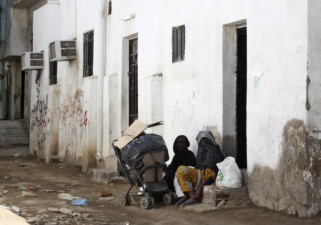
Riyadh: Foreign workers in Saudi Arabia stayed away en masse from offices, stores and other workplaces on Monday as the government mounted a crackdown on illegal residents.
Authorities in Saudi Arabia — the biggest labour market in the Gulf, and home to an estimated two million to three million illegal foreign workers - have raided office buildings and set up document checkpoints on main roads recently for workers here illegally, according to workers, Saudis and media reports.
The sweeps make good on years of government promises to reduce the ranks of foreign workers who have kept much of the country’s private sector afloat even as the number of jobless young Saudis soars.
The government didn’t respond to requests to comment on the efforts or describe their scope.
Saudi labour officials said on Friday that their targets included 250,000 small and medium businesses that failed to employ at least one Saudi. Over the weekend, foreign workers spread word over social media that a crackdown was under way, turning many workplaces into ghost operations on Sunday and Monday. Workers who knew or feared their papers weren’t in order worked in offices with the lights off or stayed away.
Operations at the Red Sea port of Jeddah, where more than half of Saudi Arabia’s imports arrive, slowed because foreign freight workers feared document checks, according to business leaders and news media reports. Around the capital, Riyadh, many retailers and coffee shops made do with one counter worker. Hotel guests could be seen carrying their own bags. Phones went unanswered. Many computer shops on Riyadh’s Devil Street — so-called for the videos sold there by South Asian workers — were shut. That spurred criticisms that the government was moving abruptly at the peril of business stability.
“Everybody is staying at home,” said a Bangladeshi taxi driver in Riyadh who said he is in the country legally. He said he had been stopped at checkpoints several times in the past two days. “Everybody is worried.”
Usually, the Riyadh office block where Irishman Paul Farrell works is bustling. South Asians are posted at the ground-floor security point. Non-Saudi Arabs — Palestinians, Syrians and Jordanians — sit at reception desks. Tea and coffee is brought around by South Asian men.
On Monday, Farrell arrived at his design-consulting firm there to find the lights off and the halls silent. “The door was locked — no security on board downstairs,” he said. “They’re clamping down.”
The world’s top oil exporter, Saudi Arabia has for decades been a haven for foreign workers. On top of 20 million Saudi citizens, the country hosts eight million legal workers and, according to some estimates, two million to three million illegal ones. These workers often provide skilled labour that not enough Saudis are qualified to do, and cheap unskilled labor that Saudis didn’t want to do.
But Saudi Arabia’s reliance on cheap foreign labour has crippled the kingdom’s private sector, economists say. With a booming population — more than two-thirds of Saudi citizens are under 30 — the region already has the world’s second-highest level of youth unemployment, after sub-Saharan Africa.
Generations of Saudis grew up to expect government jobs, but those opportunities are dwindling. Public-sector wages and benefits account for 40 per cent of Saudi government spending, said Steffen Hertog, a lecturer in comparative politics at the London School of Economics, citing government statistics.
Past efforts to push nationals into the private sector have failed in part because Saudi schools haven’t produced enough skilled local workers, said Mishrif Ashraf, a lecturer in Middle East political economy at King’s College in London.
Such a labour crackdown threatens to stoke inflation, particularly in construction, transport and other firms that use large numbers of foreign workers, financial analyst Iyad Khalid Ghulam of Saudi-based NCB Capital said.
In Riyadh, supporters of the labor-market overhaul urged patience, saying the campaign was crucial to making conditions better for foreign workers, reducing the kingdom’s reliance on oil revenues and restructuring the labour market to ensure jobs for young Saudis.












